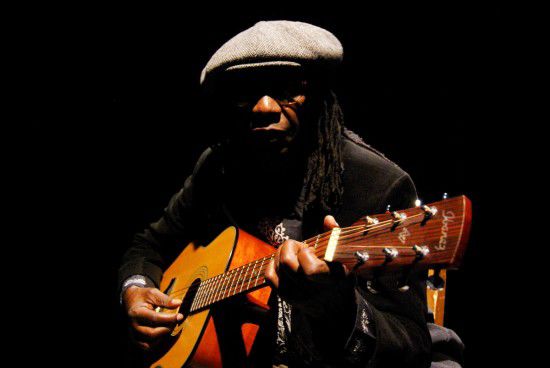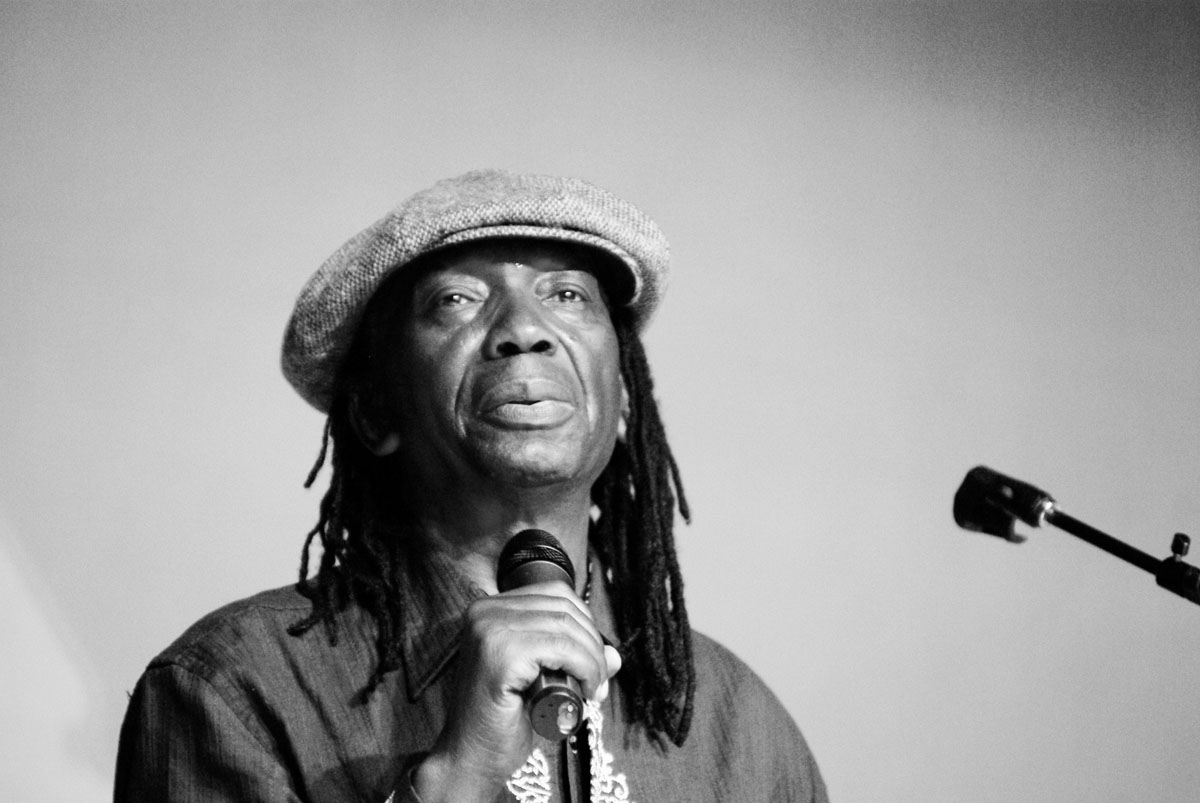Thomas Mapfumo, one of the most famous Zimbabwean musicians of all time, lives and makes music in Eugene.
Story by Kourtney Hannaway
Photos by Kevin Minderhout
Multimedia by Dave Martinez & Kevin Minderhout
Pulsing, meandering music spills out from a house tucked away in the comfy overgrowth near Hendricks Park. At the source are five grinning men moving effortlessly with the rhythm. They chatter to one another while their music continues undisturbed.
Video
Thomas Mapfumo, the group’s leader, is the front man to a band called The Blacks Unlimited. Originally from Zimbabwe, he decided to leave after imprisonment and multiple death threats made staying dangerous for him and his children. Four of his band members accompanied the Mapfumo family to Eugene, although the band tours internationally for crowds of thousands.
“The world knows my music as the voice of the voiceless,” Mapfumo, who carries the nickname “The Lion of Zimbabwe,” says. “That’s how the world sees me.”
Mapfumo’s first memories of music include blowing into his cupped hands as a young boy, whistling across the plains of Africa and making the noises that became his first songs. The elderly members of his village had their own melodies, sung when they believed their bodies to be possessed by the spirits of ancestors. In time he heard them all.
His childhood filled his head with the sounds and rhythms of his people. But only a few years later, Mapfumo recalls listening to the Beatles, Rolling Stones, and Bob Marley among many other musicians and styles, ranging from hard rock to smooth jazz. He soon learned to sing and play guitar for cover bands around the area.
By the 1970s and Mapfumo’s early twenties, Zimbabwe (then known as Rhodesia) was gripped by political. As Zimbabweans began fighting for independence, the musician steered away from playing foreign cover songs and shifted to address present political challenges.
“I believe I am a freedom fighter,” he says.
Mapfumo’s earlier group, called the Hallelujah Chicken Run Band, tried recording seven songs in the popular Afrorock genre, but found their audience liked only one. The hit, called “Ngoma Yarira” (“an exhortation to fight for civil rights”), included traditional Zimbabwean rhythms and melody. Mapfumo remembers feeling pleased that he had finally found his direction. The band expanded on the success of that song, developing a new style Mapfumo called chimurenga, meaning ‘struggle’ in Shona, a Bantu language of Zimbabwe’s Shona people.
The chimurenga style weaves together melodies and rhythms from Mapfumo’s childhood with blunt, commanding lyrics criticizing government leadership and the condition of the nation, all in the Shona language. Many of Mapfumo’s songs use the distinct mbira, a traditional instrument with a sound somewhere between steel drums and harpsichord.
“Though it has a strong message, it’s danceable and exciting,” Mapfumo says of his music.
Although Zimbabwe received independence in 1980, corruption returned seven years later with the leadership of Robert Mugabe, whose administration Mapfumo calls the “white regime.” The musician says he saw a government that slaughtered its own people for supporting political opposition.
“Just because they were supporters of a different political party, this was how they had to pay,” Mapfumo says. “Yes, they paid with their lives.”
He wrote lyrics to all of it.
“My music played a very important role during the struggle,” he says. “I helped a lot of youngsters to get out of that country, get arms, be trained, and come back fighting the white regime. I was standing along my own people, because they were the oppressed ones.”
It grew increasingly dangerous for Mapfumo and his family to stay in Zimbabwe, and so he traveled to the U.S. in 2001. He chose to settle his family in Eugene because it was “a quiet place.” In his free time he watches soccer, reminiscing about the team he used to own in Zimbabwe. His main concerns focus around his children: Mati, 12; Chidzha, 22; and Ty, 26.
“[In a big city] they would have been attracted to bad things,” he says. “I don’t want them to lose focus on what’s important.”
Mapfumo’s music has reflected the frustrations and afflictions of Zimbabwe and continues to be a driving force for his people. However, despite his confident energy, Mapfumo’s been singing the same message for years.
“Sometimes, you think well, our people have been struggling for a long time,” he says. “You start thinking, when is this going to end? When are they going to enjoy the freedom that they fight for?”
The musician is a mixture of unwavering optimism and reluctant acceptance of a bleak reality. Perhaps this is because the success of his music was surprising, even to himself.
“I never dreamt one day that I could play in America,” he says. “When I was a kid, I used to read a lot of cowboy comics, or about the places we are seeing today. I never dreamt that one day I’m gonna see these places. It was just a dream, but here I am.”
Despite feeling discouraged at times, Mapfumo continues to wait for the changes he has long sung about.
“Sometimes I think, I am getting old. Should I try something else?” he says. “But when you’ve been a musician, you just want to carry on, whatever it takes.”
Enjoy a private concert with Mapfumo in The Lion’s Roar.









